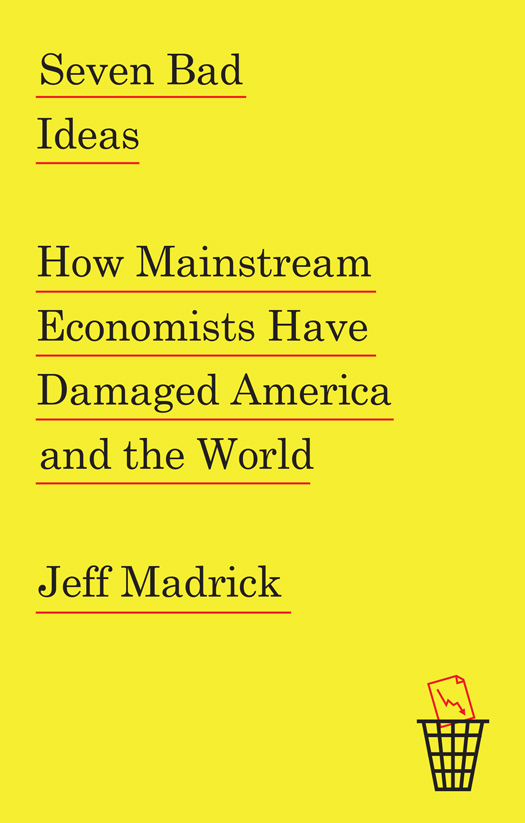
Seven Bad Ideas
How Mainstream Economists Have Damaged America and the World
کتاب های مرتبط
- اطلاعات
- نقد و بررسی
- دیدگاه کاربران
نقد و بررسی

August 25, 2014
Madrick (Age of Greed) takes aim, in dense but readable prose, at mainstream economic thinking: the ideas that are so commonly accepted that they’re now taken as gospel. Focusing on the 2008 recession, he presents a thorough exegesis of this accepted wisdom and its effect on the economy, starting with Adam Smith’s “Invisible Hand” theory, which describes how buyers and sellers decide a good or service’s ideal price. Madrick goes on to examine Say’s Law and austerity economics, John Maynard Keynes’s theories on interest rates, and Milton Friedman’s theories of free markets. He also addresses the question: where did we go awry? Mainly, he says, when we started treating economics as a perfect science, thereby giving “economic ideas more credibility than they often deserve.” Moreover, modern thought has led us to believe that the government is almost always bad and the markets almost always good. Those bankers and economists who failed to avert the crisis aren’t evil, according to Madrick, just misguided, particularly in oversimplifying major economic shifts. This book is an attempt to inject the complexity back in. As a result, it’s a tough read for the nonacademic reader, but one well worth the effort.

September 1, 2014
For the crash they failed to predict, for the Great Recession that followed and for the piddling recovery, a longtime economics journalist blames the wrongheaded theories of orthodox economists. By "orthodox," Harper's columnist Madrick (Age of Greed: The Triumph of Finance and the Decline of America, 1970 to the Present, 2011, etc.) means the right and center-left economists who've taken their cues for the past 40 years from Milton Friedman, "the godfather" of the laissez faire revolution. The author marvels at how Friedman and his disciples have escaped censure for policy recommendations accounting for our current mess and takes a stick to the profession for its insularity, trendiness and refusal to abandon theory in the face of stark, real-world facts. Their litany of error, Madrick insists, stems from reliance on Adam Smith's Invisible Hand theory: that, without any outside interference, buyers and sellers will reach a just accommodation. This 18th-century insight, writes the author, was descriptive rather than prescriptive and surely an incomplete model of modern markets. Its simplicity encouraged the modern era's move toward widespread deregulation. From the Freidmanites' horror at the prospect of government intervention flowed other bad ideas: that "supply creates its own demand" and economies will self-adjust; that government is useful only for correcting occasional market failures; that targeting inflation is all that really matters; that markets are highly rational, unsusceptible to fashion or speculative bubbles; that globalization will somehow triumph, and free trade will lift all boats. Madrick hammers mainstream economists for their insistence that economics is a science rooted in mathematics, unaffected by political bias. We'd do better, he argues, to make room for sociology, psychology, history, philosophy and theology to better account for real-world uncertainties and ambiguities. Economics, he insists, "is a set of value judgments," and notions of decency and community are every bit as relevant as "the special knowledge" held by the high priests. A readable, useful economic text. Somewhere, John Maynard Keynes is smiling.
COPYRIGHT(2014) Kirkus Reviews, ALL RIGHTS RESERVED.

Starred review from July 1, 2014
The very fact that so few economists saw the 2008 economic collapse coming indicates how out of touch they were (and are) with economic realities. Enamored with the idea that capitalism is self-correcting, they failed to heed ample warnings of severe imbalances and risky behavior caused by lack of regulation of the financial markets. Financial journalist Madrick draws on the works of several well-regarded economists, including John Maynard Keynes and Milton Friedman, as well as philosopher-economist John Stuart Mills and others to examine the shortcomings of contemporary economics. Madrick offers an overview of how economic thinking has evolved from Adam Smith's invisible hand concept, taking aim at seven major ideas that have driven economists in the past 30 years and led to enormous harm. He explores the contradictions in economic theories as economists square off over philosophical beliefs about the proper role of government in the economy, the relative merits of deficits, and government economic stimulus. Debunking many of the ideas of orthodox economics, he laments how little consideration economists give to social justice and human rights or even history. Madrick argues strongly that government support for the nation's infrastructure is as important to the economy as private capital investment. This is a highly accessible look at the dismal science and why it's important to understand the philosophy behind the science of economics.(Reprinted with permission of Booklist, copyright 2014, American Library Association.)

























دیدگاه کاربران